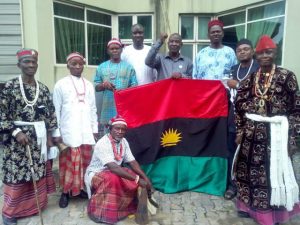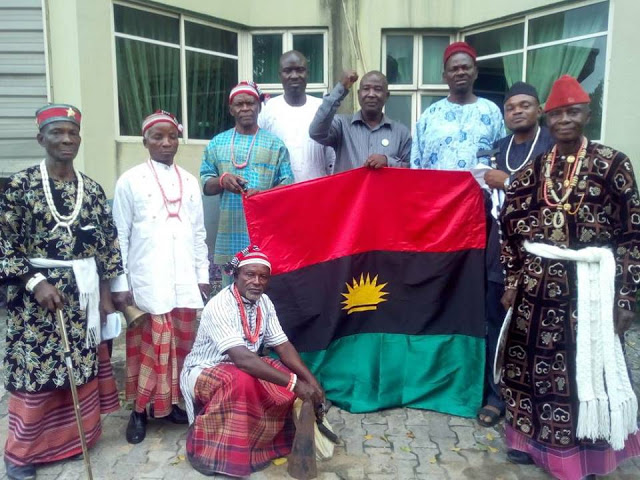
Before the outbreak of the Nigerian civil war, there existed no much pronounced hatred or rejection of Igbos within the coastal area of Biafraland or old the Eastern region and not even in most Southern parts of Nigeria.
All over the Biafran territory, there were noticeable influence of the Igbos as a tribe. Igbo as it were, was not a tribe but a grouped class of people that spoke similar languages with same ancestry. There are quite a number of Igbos who consider themselves to have descended from non-Igbo speaking areas like Bini, Ijaw, Ibibio, Igala, etcetera. These tribes never had one central administrative system apart from minor differences in cultures. This was what obtained all over Biafraland. This is the reason why even in Ijawland till date, there exists diverse tribes. Some were ruled by their tribal kings while others were ruled by their convenient cultural systems just like most Igbos. All over the land of Biafra, there existed no definitive boundaries demarcating Igbos, Ijaws, Idomas, Ibibios, Annangs, Efiks, Isokos and Urhobos.
Igbo had central Biafran ethnicity that one should not refer to as a group. They become grouped today because of similarity in tongue or language. For example, the Igbos in the present day Delta State like Aboh, Ika, etcetera, were in the olden days, seen and regarded as kins by our forefathers. And till today, we yet have a community in Oyiakiri kingdom that is Igbo-speaking in Delta State. My dad had always told me how they used to visit my community which is Odoni, to celebrate our festival with us when all the Oyiakiri sons gathered to celebrate with their brothers. In Oyiakiri history, it is stated that the first point of settlement was in Aboh which is an Igbo-speaking tribe in Delta State, before they migrated to Ebeni, a mother town, to finally settle.
The Ijaws had a very robust relationship with the Igbos like those presently domiciled in Abia, Imo and Anambra States. The relationship was so close and deep that the Igbo-speaking tribes in the present day Rivers State, cannot deny the mixture of Ijaw blood amongst most of them. Such tribes like Iwhuruoha (erroneously referred to as Ikwerre) Ogba, Ekpeye, etcetera, cannot refute the mixture of Ijaw, Bini and Igbo blood running in their veins. Realistically, history still accounts that tribes like Egbema and Ndoki that are Igbo-speaking, were founded by the Ijaws just like Opobo which if not for today’s Ijaw awareness, would have been entirely Igbo-speaking. If Opobo were to be totally Igbo-speaking in the present dispensation, someone would have risen up to claim that because they speak Igbo, they are not brothers or related.
Now, to the influence and blackmail of the Nigerian State against Igbos.
THE CIVIL WAR
Growing up in my early days and finding it difficult to form vocabularies in my own native language as an Ijaw lad, my older friends who experienced the war or were given birth to shortly after the war, would always advise us on the importance of learning how to speak our language to avoid mistaking it for another. They would tell us how most of our people who could not speak Ijaw during the war, were killed just because the Nigerian soldiers failed to believe that they were not Igbos.
It was really a period of great fear and torment. The Nigerian army hunted for Igbo blood. If one could then prove not to be an Igbo, such an individual could then be rescued otherwise, he would be summarily executed.
It was really horrendous and entirely a genocidal target against the Igbo race.
The soldiers conducted house to house searches in communities, hunting down our Igbo brothers from city to city, town to town, village to village. Igbos were marked species for the slaughter. Consequently, those closest to the coast where the war raged, had to immediately activate a strategy for survival. They had to repudiate their Igbohood to save their lives. The Ijaws and other tribes whose people bore identical Igbo names had to immediately adopt to Ijaw names. My dad told me of certain people in my community that used to bear Igbo names but had to resort to instant changes to Ijaw equivalents. In fact, some Igbo songs which we used to sing in my community festival, had to be changed to Ijaw renditions. It is in this that part of my community that has recorded predominant Igbo ancestry, from Aboh in Delta State.
We all were victims of the oil war orchestrated and unleashed on us Biafrans by Nigeria. Yes, some Ijaws unfortunately fought on the side of Nigeria but that does not mean that all Ijaws were part and parcel of the oppressors. At least, in the absence of any other, the death of Major Isaac Adaka Boro who led some of the Ijaws to fight on the side of Nigeria and who later got dastardly executed by the same Nigerian army he served, proved to us that these people really intended to conquer us all.
A Biafran veteran who I met sometime ago in Lagos, told me that as he returned to the city at the end of the war, some Igbos never wanted to be publicly identified. They bluntly hated the fact that they were Igbos. This denial of their identity could not stand however, because their villages fell into the Nigeria structured geo-political entity called region. Ideally, a Nigerianised Igbo is sharply different from the real Igbo in during the pre-war era.
Published by:
Chibuike John Nebeokike
For: Radio Biafra Media






























